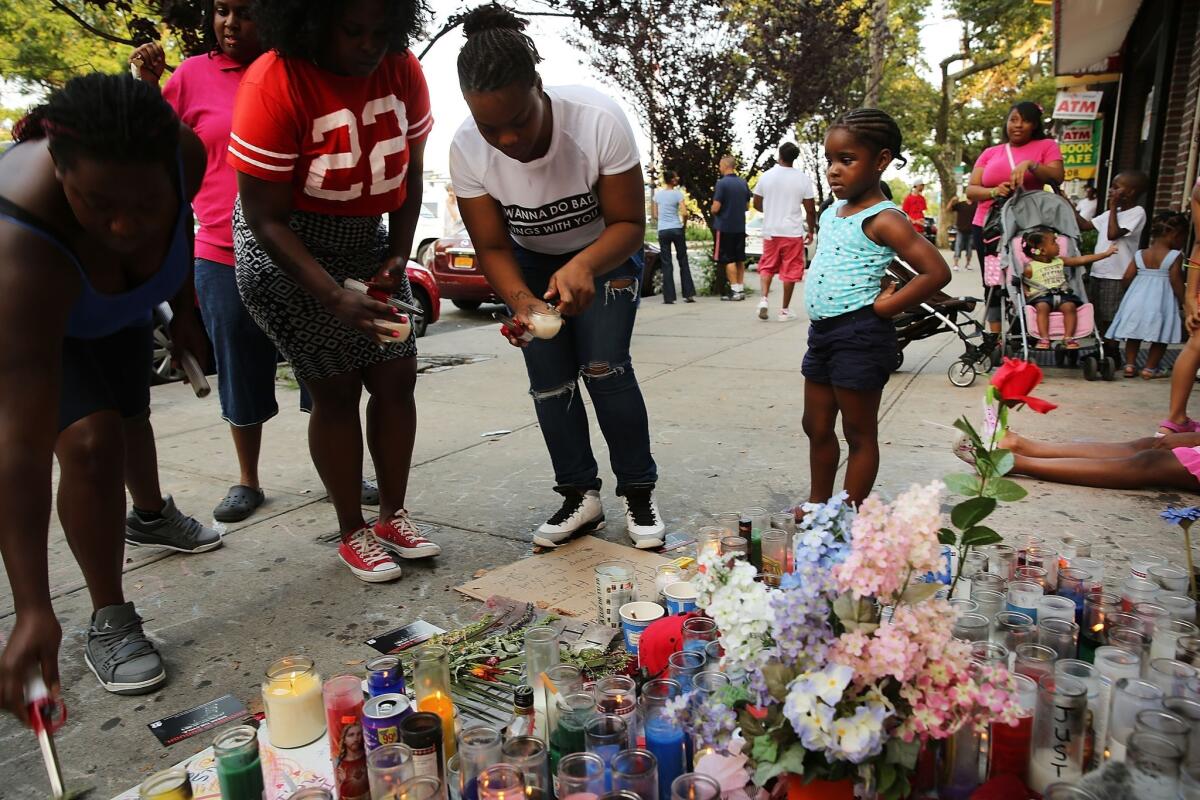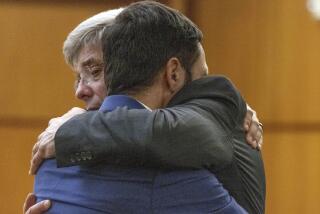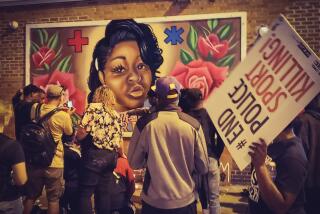New Yorker who died after apparent chokehold during arrest is mourned

- Share via
Reporting from New York — The mourners trickled slowly into the crowded church. Inside, a huge man lay in a white casket topped by white and yellow flowers — a man who in life was known to few outside his Staten Island neighborhood.
In death, though, Eric Garner has become a symbol of policing gone awry: He was videotaped as he was put into an apparent chokehold by police officers. His case has jolted a city that began the year with a new mayor, Bill de Blasio, and a new police commissioner, William J. Bratton, vowing better lives for people such as Garner: black men living far from the glassy skyscrapers and shaded brownstones of the well-heeled.
Civil rights leaders and other New Yorkers say Garner’s death July 17 shows the need for faster change in the New York Police Department.
“People in all five boroughs are fired up. They’re fired up right now because we don’t like this,” said Isaac L. Mickens, a pastor, community activist and friend of Garner’s family. “We need action.”
Before the service in a Brooklyn church, a public viewing drew friends of Garner, civic leaders and strangers who knew of his death only through the media.
Earl Simms was among the friends. “I just saw him last Wednesday,” he said.
Simms wiped away tears and sweat as he stood outside on the sweltering 90-degree day after passing by the casket.
“I’m quite certain that when he woke up Thursday, he didn’t expect this to happen,” Simms said, speculating that officers were intimidated by Garner’s size and motivated by racism.
“The racial profiling has to stop,” said Simms, who is black and had known Garner five years.
By now, the story of Garner’s death is well-known. The 43-year-old father of six, who according to various media reports weighed 350 to 400 pounds, was asthmatic.
He had a history of arrests for selling untaxed cigarettes in his working-class neighborhood.
On the afternoon of July 17, witnesses say, Garner had broken up a street fight between two other men when police approached him.
A witness with a video camera recorded what happened next: Garner telling officers to leave him alone; police moving closer as Garner, sounding increasingly panicked, tried to avoid being handcuffed and said, “Don’t touch me, don’t touch me.”
One officer approached him from behind and wrapped an arm around his neck. Three other officers joined in restraining Garner, who fell to the ground.
Someone pushed his face into the sidewalk. “I can’t breathe. I can’t breathe,” Garner said, his voice becoming more muffled.
Within an hour, he was dead.
Police released a statement shortly afterward saying Garner had gone into cardiac arrest as officers tried to arrest him on suspicion of selling illegal cigarettes.
Garner’s relatives say that despite his health problems he would be alive if police had not piled onto him.
“That little bit of breath he had, they took it from him,” Garner’s sister Ellisha Flagg said during a march on Staten Island on Tuesday night.
In the aftermath of Garner’s death, Bratton announced a “top-to-bottom review” of training of New York’s more than 30,000 police officers, especially in use of force.
Bratton, who headed the Los Angeles Police Department from 2002 to 2009 and is credited with reforms that reduced crime and improved community relations, said he would invoke those tactics to revamp the NYPD.
Bratton has said the grip that the police officer, Daniel Pantaleo, used on Garner “appeared to have been a chokehold,” which would make it illegal.
De Blasio, who was elected on promises to close the gaps between rich and poor, black and white, said he found the video of Garner’s death “very troubling.”
“I watched it the same way a family member would watch it, and it was very sad,” said De Blasio, who was highly critical of what he considered racially biased police tactics under Bratton’s predecessor, Raymond Kelly.
Pantaleo’s gun and badge have been taken away pending results of an investigation, and a second officer who was at the scene has been put on desk duty. Four emergency medical workers who witnesses say did not try to revive Garner have been suspended.
Bratton said Tuesday that he did not believe race had anything to do with what happened to Garner. Instead, he said, the incident underscored the need for better officer training.
Mourners disagreed.
Flagg speculated that police assumed the worst about her brother when they saw him standing on the street in his wrinkled shorts and T-shirt.
“He was discriminated” against, she said. “They might have thought he didn’t have nobody or a family.”
Mickens said that whatever the officers’ motivation, the fact that Garner was making a living selling illegal cigarettes on the street showed that the city has far to go in bridging its income gap.
As for what should happen to the officer who put his arm around Garner’s neck, Mickens said, “He should be locked up.”
@tinasusman
More to Read
Sign up for Essential California
The most important California stories and recommendations in your inbox every morning.
You may occasionally receive promotional content from the Los Angeles Times.














